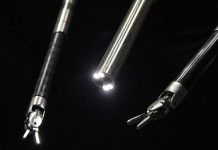
In a study from Ruhr University Bochum, scientists found that AI with infrared imaging enables precise colon cancer diagnostics.
The progress in therapy options over the past years has strongly improved the chances of a cure for people with colon cancer.
However, these new methods such as immunotherapies, require precise diagnosis so that they can be specifically tailored to the individual.
In the current study, the team artificial intelligence in combination with infrared imaging to optimally tailor colon cancer therapy to individual patients.
The method can complement existing pathological analyses.
The team has been developing a new digital imaging method over the past few years.
In cooperation with clinical researchers, the team was able to show that the use of deep neural networks makes it possible to reliably determine microsatellite status, a prognostically and therapeutically relevant parameter, in colon cancer.
In this process, the tissue sample goes through a standardized, user-independent, automated process and enables a spatially resolved differential classification of the tumor within one hour.
In classical diagnostics, microsatellite status is determined either by complex immunostaining of various proteins or by DNA analysis.
But 15% to 20% of colon cancer patients show microsatellite instability in the tumor tissue. This instability is a positive biomarker indicating that immunotherapy will be effective.
With the ever-improving therapy options, the fast and uncomplicated determination of such biomarkers is also becoming more and more important.
Based on IR microscopic data, neuronal networks were modified, optimized, and trained at PRODI to establish label-free diagnostics.
Unlike immunostaining, this approach does not require dyes and is much faster than DNA analysis.
The researchers were able to show that the accuracy of IR imaging for determining microsatellite status comes close to the most common method used in the clinic, immunostaining.
Through further development and optimization of the method, they expect a further increase in accuracy.
If you care about cancer, please read studies that vitamin D level in your blood may predict colon cancer risk, and vitamin D supplements strongly reduces cancer death.
For more information about health please see recent studies about how COVID-19 affects the colon, and results showing no one should cancel their colonoscopies.
The study was conducted by Professor Klaus Gerwert et al and published in the European Journal of Cancer.
Copyright © 2023 Knowridge Science Report. All rights reserved.



